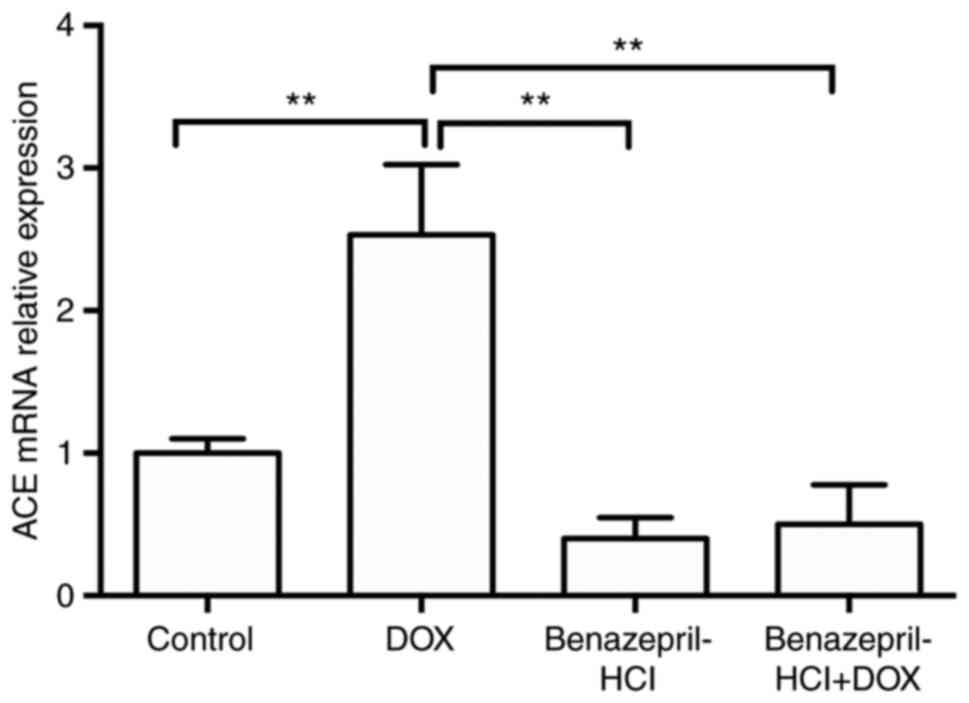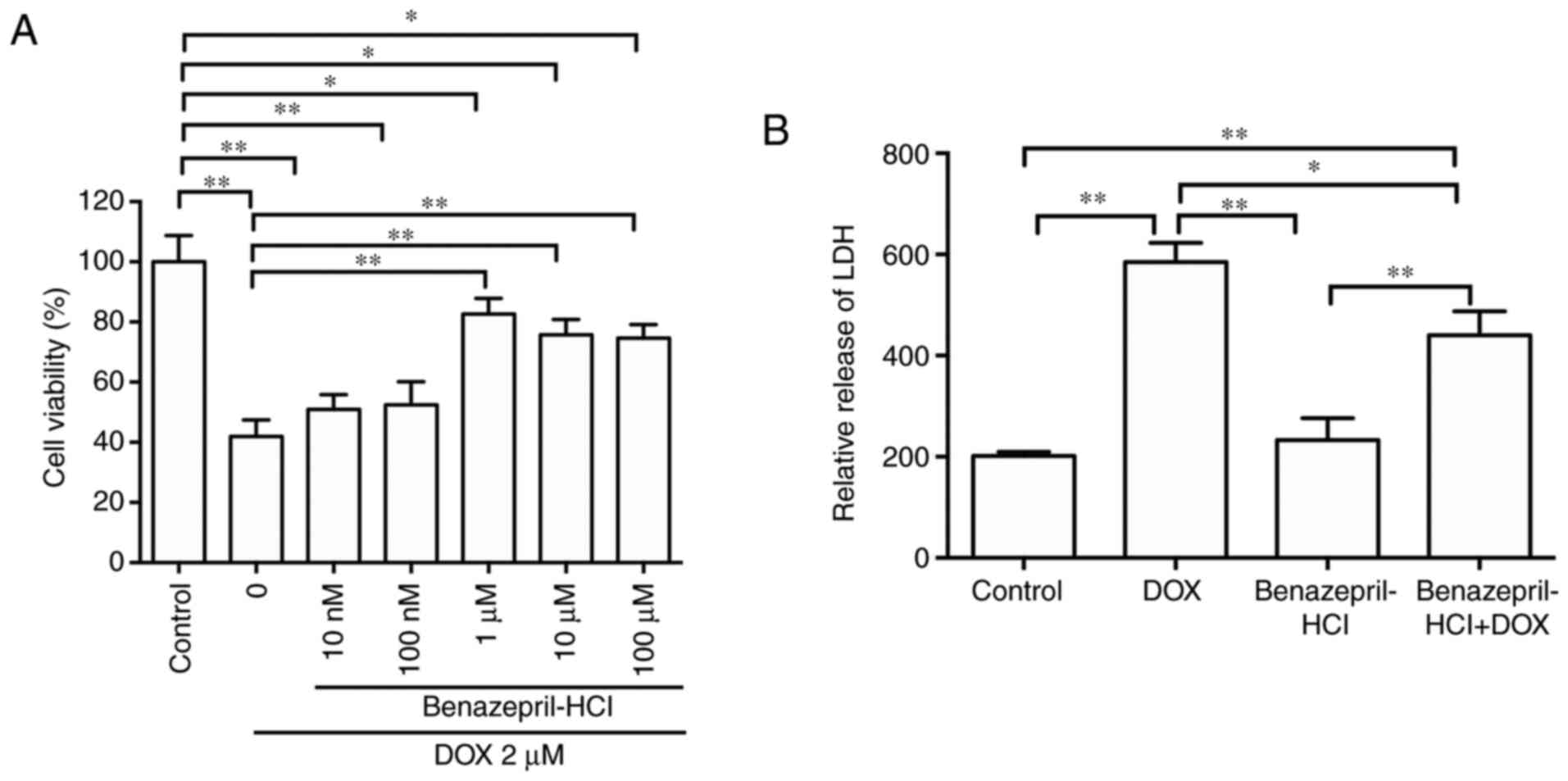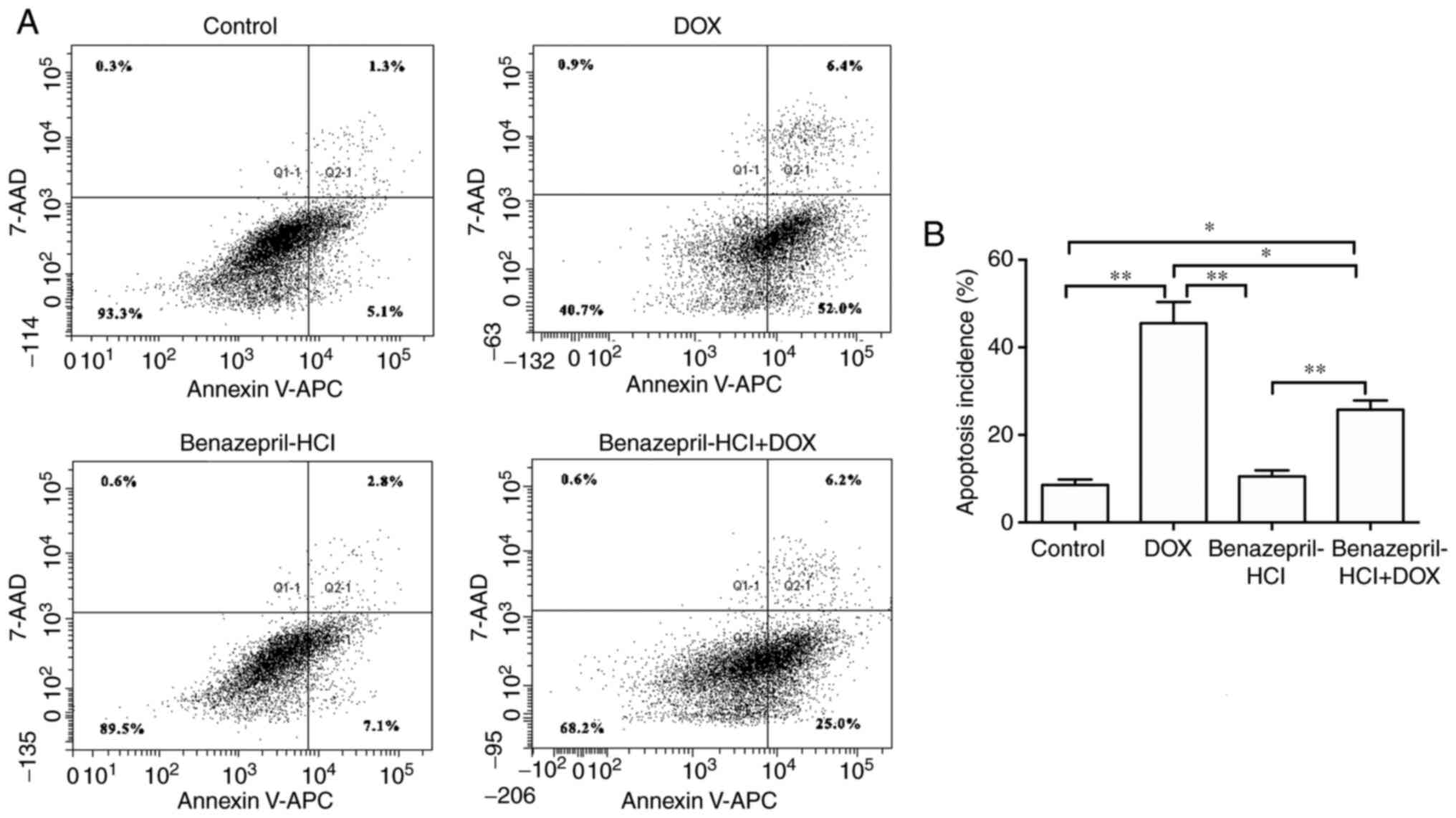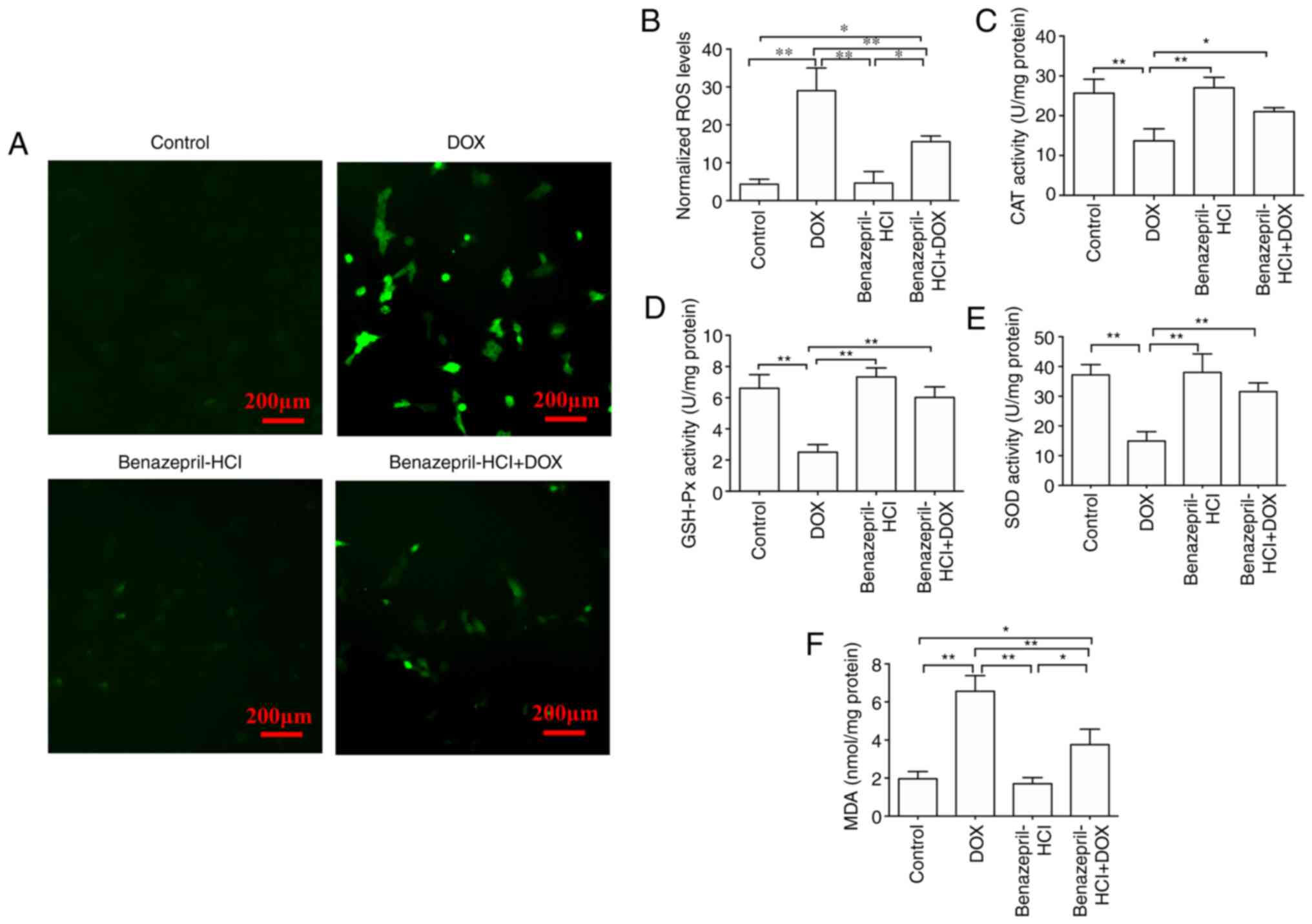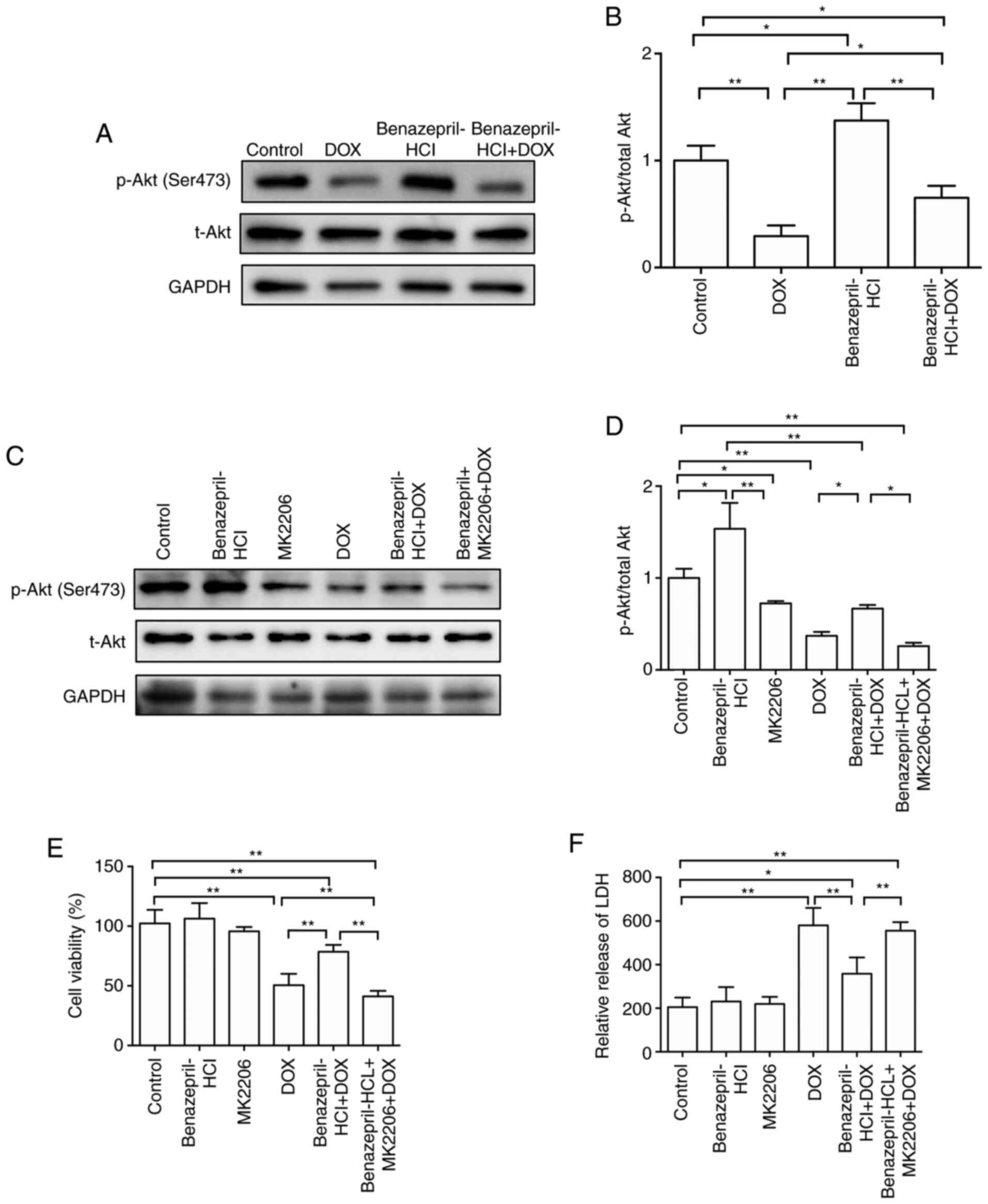|
1
|
Rosen MR, Myerburg RJ, Francis DP, Cole GD
and Marbán E: Translating stem cell research to cardiac disease
therapies: Pitfalls and prospects for improvement. J Am Coll
Cardiol. 64:922–937. 2014.PubMed/NCBI View Article : Google Scholar
|
|
2
|
Khouri MG, Klein MR, Velazquez EJ and
Jones LW: Current and emerging modalities for detection of
cardiotoxicity in cardio-oncology. Future Cardiol. 11:471–484.
2015.PubMed/NCBI View Article : Google Scholar
|
|
3
|
Angsutararux P, Luanpitpong S and
Issaragrisil S: Chemotherapy-induced cardiotoxicity: Overview of
the roles of oxidative stress. Oxid Med Cell Longev.
2015(795602)2015.PubMed/NCBI View Article : Google Scholar
|
|
4
|
Ma ZG, Kong CY, Wu HM, Song P, Zhang X,
Yuan YP, Deng W and Tang QZ: Toll-like receptor 5 deficiency
diminishes doxorubicin-induced acute cardiotoxicity in mice.
Theranostics. 10:11013–11025. 2020.PubMed/NCBI View Article : Google Scholar
|
|
5
|
Cappetta D, De Angelis A, Sapio L,
Prezioso L, Illiano M, Quaini F, Rossi F, Berrino L, Naviglio S and
Urbanek K: Oxidative stress and cellular response to doxorubicin: A
common factor in the complex milieu of anthracycline
cardiotoxicity. Oxid Med Cell Longev. 2017(1521020)2017.PubMed/NCBI View Article : Google Scholar
|
|
6
|
Nithipongvanitch R, Ittarat W, Cole MP,
Tangpong J, Clair DK and Oberley TD: Mitochondrial and nuclear p53
localization in cardiomyocytes: Redox modulation by doxorubicin
(Adriamycin)? Antioxid Redox Signal. 9:1001–1008. 2007.PubMed/NCBI View Article : Google Scholar
|
|
7
|
Phaniendra A, Jestadi DB and Periyasamy L:
Free radicals: Properties, sources, targets, and their implication
in various diseases. Indian J Clin Biochem. 30:11–26.
2015.PubMed/NCBI View Article : Google Scholar
|
|
8
|
Murabito A, Hirsch E and Ghigo A:
Mechanisms of anthracycline-induced cardiotoxicity: Is
mitochondrial dysfunction the answer? Front Cardiovasc Med.
7(35)2020.PubMed/NCBI View Article : Google Scholar
|
|
9
|
Wallace KB, Sardão VA and Oliveira PJ:
Mitochondrial determinants of doxorubicin-induced cardiomyopathy.
Circ Res. 126:926–941. 2020.PubMed/NCBI View Article : Google Scholar
|
|
10
|
Fu X, Kong L, Tang M, Zhang J, Zhou X, Li
G, Wang H and Fu F: Protective effect of ocotillol against
doxorubicin-induced acute and chronic cardiac injury. Mol Med Rep.
9:360–364. 2014.PubMed/NCBI View Article : Google Scholar
|
|
11
|
Wang H, Yu P, Gou H, Zhang J, Zhu M, Wang
ZH, Tian JW, Jiang YT and Fu FH: Cardioprotective effects of 20
(S)-ginsenoside Rh2 against doxorubicin-induced cardiotoxicity in
vitro and in vivo. Evid Based Complement Alternat Med.
2012(506214)2012.PubMed/NCBI View Article : Google Scholar
|
|
12
|
Nazmi AS, Ahmad SJ, Pillai KK, Akhtar M,
Ahmad A and Najmi AK: Protective effects of Bombyx mori,
quercetin and benazepril against doxorubicin induced cardiotoxicity
and nephrotoxicity. J Saudi Chem Soc. 20 (Suppl 1):S573–S578.
2016.
|
|
13
|
Ganatra S, Nohria A, Shah S, Groarke JD,
Sharma A, Venesy D, Patten R, Gunturu K, Zarwan C, Neilan TG, et
al: Upfront dexrazoxane for the reduction of anthracycline-induced
cardiotoxicity in adults with preexisting cardiomyopathy and
cancer: A consecutive case series. Cardiooncology.
5(1)2019.PubMed/NCBI View Article : Google Scholar
|
|
14
|
Sacco G, Bigioni M, Evangelista S, Goso C,
Manzini S and Maggi CA: Cardioprotective effects of zofenopril, a
new angiotensin-converting enzyme inhibitor, on doxorubicin-induced
cardiotoxicity in the rat. Eur J Pharmacol. 414:71–78.
2001.PubMed/NCBI View Article : Google Scholar
|
|
15
|
Guglin M, Munster P, Fink A and Krischer
J: Lisinopril or Coreg CR in reducing cardiotoxicity in women with
breast cancer receiving trastuzumab: A rationale and design of a
randomized clinical trial. Am Heart J. 188:87–92. 2017.PubMed/NCBI View Article : Google Scholar
|
|
16
|
Spallarossa P, Guerrini M, Arboscello E
and Sicbaldi V: Enalapril and carvedilol for preventing
chemotherapy-induced left ventricular systolic dysfunction. J Am
Coll Cardiol. 62:2451–2452. 2013.PubMed/NCBI View Article : Google Scholar
|
|
17
|
Choi HS, Park ES, Kang HJ, Shin HY, Noh
CI, Yun YS, Ahn HS and Choi JY: Dexrazoxane for preventing
anthracycline cardiotoxicity in children with solid tumors. J
Korean Med Sci. 25:1336–1342. 2010.PubMed/NCBI View Article : Google Scholar
|
|
18
|
Octavia Y, Tocchetti CG, Gabrielson KL,
Janssens S, Crijns HJ and Moens AL: Doxorubicin-induced
cardiomyopathy: From molecular mechanisms to therapeutic
strategies. J Mol Cell Cardiol. 52:1213–1225. 2012.PubMed/NCBI View Article : Google Scholar
|
|
19
|
Zablocki D and Sadoshima J: Angiotensin II
and oxidative stress in the failing heart. Antioxid Redox Signal.
19:1095–1109. 2013.PubMed/NCBI View Article : Google Scholar
|
|
20
|
King JN, Font A, Rousselot JF, Ash RA,
Bonfanti U, Brovida C, Crowe ID, Lanore D, Pechereau D, Seewald W
and Strehlau G: Effects of benazepril on survival of dogs with
chronic kidney disease: A multicenter, randomized, blinded,
placebo-controlled clinical trial. J Vet Intern Med. 31:1113–1122.
2017.PubMed/NCBI View Article : Google Scholar
|
|
21
|
Chan KK, Buch A, Glazer RD, John VA and
Barr WH: Site-differential gastrointestinal absorption of
benazepril hydrochloride in healthy volunteers. Pharm Res.
11:432–437. 1994.PubMed/NCBI View Article : Google Scholar
|
|
22
|
Muñoz-Durango N, Fuentes CA, Castillo AE,
González-Gómez LM, Vecchiola A, Fardella CE and Kalergis A: Role of
the renin-angiotensin-aldosterone system beyond blood pressure
regulation: Molecular and cellular mechanisms involved in end-organ
damage during arterial hypertension. Int J Mol Sci.
17(797)2016.PubMed/NCBI View Article : Google Scholar
|
|
23
|
Parving HH: Diabetic nephropathy.
Prevention and treatment. Kidney Int. 60:2041–2055. 2001.PubMed/NCBI View Article : Google Scholar
|
|
24
|
Yim HE and Yoo KH: Renin-angiotensin
system-considerations for hypertension and kidney. Electrolyte
Blood Press. 6:42–50. 2008.PubMed/NCBI View Article : Google Scholar
|
|
25
|
Livak KJ and Schmittgen TD: Analysis of
relative gene expression data using real-time quantitative PCR and
the 2(-Delta Delta C(T)) method. Methods. 25:402–408.
2001.PubMed/NCBI View Article : Google Scholar
|
|
26
|
Wang Z, Wang J, Xie R, Xie R, Liu R and Lu
Y: Mitochondria-derived reactive oxygen species play an important
role in doxorubicin-induced platelet apoptosis. Int J Mol Sci.
16:11087–11100. 2015.PubMed/NCBI View Article : Google Scholar
|
|
27
|
Kuyumcu F and Aycan A: Evaluation of
oxidative stress levels and antioxidant enzyme activities in burst
fractures. Med Sci Monit. 24:225–234. 2018.PubMed/NCBI View Article : Google Scholar
|
|
28
|
Ma ZG, Yuan YP, Xu SC, Wei WY, Xu CR,
Zhang X, Wu QQ, Liao HH, Ni J and Tang QZ: CTRP3 attenuates cardiac
dysfunction, inflammation, oxidative stress and cell death in
diabetic cardiomyopathy in rats. Diabetologia. 60:1126–1137.
2017.PubMed/NCBI View Article : Google Scholar
|
|
29
|
Kumari H, Huang WH and Chan MWY: Review on
the role of epigenetic modifications in doxorubicin-induced
cardiotoxicity. Front Cardiovasc Med. 7(56)2020.PubMed/NCBI View Article : Google Scholar
|
|
30
|
Munger MA: Use of angiotensin receptor
blockers in cardiovascular protection: Current evidence and future
directions. P T. 36:22–40. 2011.PubMed/NCBI
|
|
31
|
Haybar H, Shahrabi S, Deris Zayeri Z and
Pezeshki S: Strategies to increase cardioprotection through
cardioprotective chemokines in chemotherapy-induced cardiotoxicity.
Int J Cardiol. 269:276–282. 2018.PubMed/NCBI View Article : Google Scholar
|
|
32
|
Yakubova A, Thorrez L, Svetlichnyy D,
Zwarts L, Vulsteke V, Laenen G, Oosterlinck W, Moreau Y, Dehaspe L,
Van Houdt J, et al: ACE-inhibition induces a cardioprotective
transcriptional response in the metabolic syndrome heart. Sci Rep.
8(16169)2018.PubMed/NCBI View Article : Google Scholar
|
|
33
|
Gujral DM, Lloyd G and Bhattacharyya S:
Effect of prophylactic betablocker or ACE inhibitor on cardiac
dysfunction and heart failure during anthracycline chemotherapy ±
trastuzumab. Breast. 37:64–71. 2018.PubMed/NCBI View Article : Google Scholar
|
|
34
|
Steele JL, Henik RA and Stepien RL:
Effects of angiotensin-converting enzyme inhibition on plasma
aldosterone concentration, plasma renin activity, and blood
pressure in spontaneously hypertensive cats with chronic renal
disease. Vet Ther. 3:157–166. 2002.PubMed/NCBI
|
|
35
|
Wan W, Jiang X, Li X, Zhang C and Yi X:
Silencing of angiotensin-converting enzyme by RNA interference
prevents H9c2 cardiomyocytes from apoptosis induced by
anoxia/reoxygenation through regulation of the intracellular
renin-angiotensin system. Int J Mol Med. 32:1380–1386.
2013.PubMed/NCBI View Article : Google Scholar
|
|
36
|
Li YW, Li YM, Hon Y, Wan QL, He RL, Wang
ZZ and Zhao CH: AT1 receptor modulator attenuates the
hypercholesterolemia-induced impairment of the myocardial ischemic
post-conditioning benefits. Korean Circ J. 47:182–192.
2017.PubMed/NCBI View Article : Google Scholar
|
|
37
|
Nie P, Meng F, Zhang J, Wei X and Shen C:
Astragaloside IV exerts a myocardial protective effect against
cardiac hypertrophy in rats, partially via activating the Nrf2/HO-1
signaling pathway. Oxid Med Cell Longev.
2019(4625912)2019.PubMed/NCBI View Article : Google Scholar
|
|
38
|
Maron BA and Leopold JA: Aldosterone
receptor antagonists: Effective but often forgotten. Circulation.
121:934–939. 2010.PubMed/NCBI View Article : Google Scholar
|
|
39
|
Gorini S, De Angelis A, Berrino L, Malara
N, Rosano G and Ferraro E: Chemotherapeutic drugs and mitochondrial
dysfunction: Focus on doxorubicin, trastuzumab, and sunitinib. Oxid
Med Cell Longev. 2018(7582730)2018.PubMed/NCBI View Article : Google Scholar
|
|
40
|
Jing S, Sun G, Cui X, Meng X, Qin M and
Sun X: Myricitrin protects against doxorubicin-induced
cardiotoxicity by counteracting oxidative stress and inhibiting
mitochondrial apoptosis via ERK/P53 pathway. Evid Based Complement
Alternat Medi. 2016(6093783)2016.PubMed/NCBI View Article : Google Scholar
|
|
41
|
Varga ZV, Ferdinandy P, Liaudet L and
Pacher P: Drug-induced mitochondrial dysfunction and
cardiotoxicity. Am J Physiol Heart Circ Physiol. 309:H1453–H1467.
2015.PubMed/NCBI View Article : Google Scholar
|
|
42
|
Mantawy EM, El-Bakly WM, Esmat A, Badr AM
and EI-Demerdash E: Chrysin alleviates acute doxorubicin
cardiotoxicity in rats via suppression of oxidative stress,
inflammation and apoptosis. Eur J Pharmacol. 728:107–118.
2014.PubMed/NCBI View Article : Google Scholar
|
|
43
|
Kurutas EB: The importance of antioxidants
which play the role in cellular response against
oxidative/nitrosative stress: Current state. Nutr J.
15(71)2016.PubMed/NCBI View Article : Google Scholar
|
|
44
|
Wu YZ, Zhang L, Wu ZX, Shan TT and Xiong
C: Berberine ameliorates doxorubicin-induced cardiotoxicity via a
SIRT1/p66Shc-mediated pathway. Oxid Med Cell Longev.
2019(2150394)2019.PubMed/NCBI View Article : Google Scholar
|
|
45
|
Malik ZA, Singh M and Sharma PL:
Neuroprotective effect of momordica charantia in global cerebral
ischemia and reperfusion induced neuronal damage in diabetic mice.
J Ethnopharmacol. 133:729–734. 2011.PubMed/NCBI View Article : Google Scholar
|
|
46
|
Jiang M, Li J, Peng Q, Liu Y, Liu W, Luo
C, Peng J, Li J, Yung KK and Mo Z: Neuroprotective effects of
bilobalide on cerebral ischemia and reperfusion injury are
associated with inhibition of pro-inflammatory mediator production
and down-regulation of JNK1/2 and p38 MAPK activation. J
Neuroinflammation. 11(167)2014.PubMed/NCBI View Article : Google Scholar
|
|
47
|
Singal PK, Li T, Kumar D, Danelisen I and
Iliskovic N: Adriamycin-induced heart failure: Mechanism and
modulation. Mol Cell Biochem. 207:77–86. 2000.PubMed/NCBI View Article : Google Scholar
|
|
48
|
Taniyama Y and Walsh K: Elevated
myocardial Akt signaling ameliorates doxorubicin-induced congestive
heart failure and promotes heart growth. J Mol Cell Cardiol.
34:1241–1247. 2002.PubMed/NCBI View Article : Google Scholar
|
|
49
|
Timolati F, Ott D, Pentassuglia L, Giraud
MN, Perriard JC, Suter TM and Zuppinger C: Neuregulin-1 beta
attenuates doxorubicin-induced alterations of
excitation-contraction coupling and reduces oxidative stress in
adult rat cardiomyocytes. J Mol Cell Cardiol. 41:845–854.
2006.PubMed/NCBI View Article : Google Scholar
|
|
50
|
Lai HC, Liu TJ, Ting CT, Sharma PM and
Wang PH: Insulin-like growth factor-1 prevents loss of
electrochemical gradient in cardiac muscle mitochondria via
activation of PI3 kinase/Akt pathway. Mol Cell Endocrinol.
205:99–106. 2003.PubMed/NCBI View Article : Google Scholar
|
|
51
|
Watkins SJ, Borthwick GM and Arthur HM:
The H9C2 cell line and primary neonatal cardiomyocyte cells show
similar hypertrophic responses in vitro. In Vitro Cell Dev Biol
Anim. 47:125–131. 2001.PubMed/NCBI View Article : Google Scholar
|
|
52
|
Branco AF, Pereira SP, Susana G, Gusev O,
Rizvanov AA and Olivira PJ: Gene expression profiling of H9c2
myoblast differentiation towards a cardiac-like phenotype. PLoS
One. 10(e0129303)2015.PubMed/NCBI View Article : Google Scholar
|















